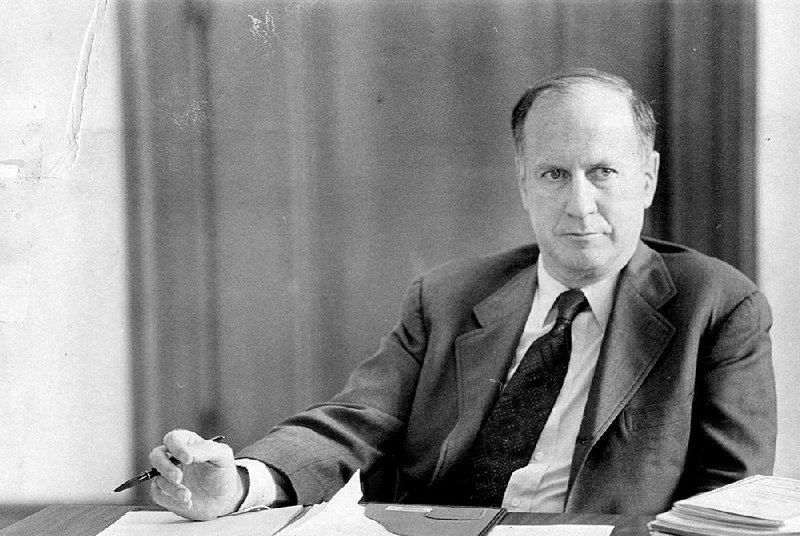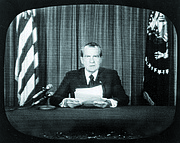An 18-year-old Mike Huckabee commended U.S. Rep. Ray Thornton, a Democrat from Arkansas, for his efforts to impeach Republican President Richard Nixon.
"You have served not only Arkansas, but the entire nation well in your work on the House Judiciary Committee during the tragic but necessary impeachment hearings," Huckabee, a student at Ouachita Baptist University, wrote to Thornton on July 29, 1974 -- only 11 days before Nixon resigned.
"I have come to greatly respect and appreciate your objectivity and your integrity as you have heard the testimony and evidence and based your decisions on those factors and not public opinion," according to Huckabee's letter, which is in the Ray Thornton Papers in the Special Collections Department at the University of Arkansas, Fayetteville.
In the Thornton papers, there are hundreds of letters from Arkansans regarding Nixon's impeachment, including one from a law professor named Bill Clinton.
Today, Huckabee -- a Fox News commentator and former Arkansas governor -- is a fierce opponent of the impeachment of President Donald Trump, who is charged with abuse of power and obstruction of Congress.
In a text message Thursday, Huckabee, a Republican, described the impeachment proceedings against Trump as an "attempted coup" that lacks credibility.
[Video not showing up above? Click here to watch » https://www.youtube.com/watch?v=JxOhBa5IO9Y]
"It was about Russia, then obstruction of justice, then quid pro quo, then bribery, then treason, then Ukraine, and when none of that worked due to only having hearsay, unnamed accusers, records that didn't back up their claims, and highly partisan Trump haters whose stories collapsed under scrutiny, the Dems went with a nebulous 'obstruction of Congress' whim," Huckabee said. "This process shreds the heart and soul of the Constitution and sets up a template for every future presidential election of the future -- if you don't win the election, then just impeach and seek to destroy the person who did win."
Huckabee said his viewpoint on impeachment hasn't changed since 1974.
"I feel stronger about it now than ever," he said.
But things were different in 1974.
"Mr. Thornton was a part of a Congress in which Democrats and Republicans alike believed there was a basis for impeachment," Huckabee said in a text Wednesday. "It was not the pathetic partisan sham this process is [referring to the impeachment of Trump]."
"I had high respect and appreciation for Ray Thornton as a man who thoughtfully looked at issues," Huckabee said. "He was a Democrat, but above all a genuine public servant. I can't imagine him yukking it up with [House Speaker] Nancy Pelosi at a signing ceremony and passing out pens."
Republicans have criticized Pelosi for making gifts out of the pens she used to sign the impeachment articles against Trump.
Thornton served on the House Judiciary Committee that investigated the June 17, 1972, Watergate break-ins. Thornton had a leading role in drafting the articles of impeachment against Nixon. The articles -- abuse of power, obstruction of justice and contempt of Congress -- were passed by the House Judiciary Committee before the end of July 1974, with Thornton voting for all three articles.
Nixon resigned on Aug. 9, 1974, before the full House of Representatives had a chance to vote on whether to impeach him.
"His resignation after all of the Republican members of the Judiciary Committee -- and House Republican leaders -- announced that they would vote for impeachment unless he resigned, made it clear that our Constitution does work and that our laws apply equally to everyone," Thornton wrote to several Arkansas constituents after Nixon's resignation.
Huckabee would go on to be Arkansas' governor from 1996 to 2007 and a presidential candidate in 2008 and 2016.
Thornton went on to serve as president of Arkansas State University, president of the University of Arkansas System and as a justice on the Arkansas Supreme Court before he died in 2016. He was also the first president of the Arkansas Lottery Commission.
When asked if President Bill Clinton deserved to be impeached -- which the House did in 1998 -- Huckabee said in a text, "even though he did commit a crime (perjury), lost his law license, and had to pay large settlement to Paula Jones for sexual harassment, in retrospect, perhaps censure would have been a better response just because despite there being bi-partisan participation in the impeachment, it was still polarizing and hurtful to the political process."
After being impeached by the House on articles of perjury and obstruction of justice, Clinton was acquitted in the Senate.
In the 1974 letter, Huckabee wrote that Thornton's appearance the previous day on CBS television's Face the Nation program had made Huckabee "even more aware of your capability as a member of our legislative body."
But Huckabee wasn't always so sure about Thornton.
"I met you personally about a year ago while I was serving as Boys State governor ('72-'73), and then recognized your down to earth quality, but to be completely honest with you, was not real sure as to your functioning as a congressman," wrote Huckabee. "Now all those doubts have disappeared, and I can say with great pride that Ray Thornton represents me in the House of Representatives."
[Gallery not loading above? Click here for more photos » arkansasonline.com/119watergate/]
In an Aug. 6, 1974, response, Thornton thanked Huckabee for his letter.
"No one can enjoy sitting in judgment on any other individual, and my decision was reached only upon the conviction that the clear and convincing evidence of high crimes and misdemeanors required a trial in the Senate," Thornton wrote.
Clinton sent Thornton a letter the same day that Huckabee did.
"I want you to know how much I approve and appreciate your remarks and your decision on the matter of impeachment," Clinton wrote on July 29, 1974. "Your treatment of the evidence seemed to me especially effective."
Thornton responded to Clinton in an Aug. 7, 1974, letter, including a sentence almost identical to the one quoted above from his letter to Huckabee.
In 1974, Clinton was teaching law at the University of Arkansas in Fayetteville. That fall, he would unsuccessfully challenge U.S. Rep. John Paul Hammerschmidt, a Republican, for his congressional seat. Clinton went on to be Arkansas governor and president of the United States.
"You are doing a great and historic service to our nation," Clinton wrote to Thornton. "Your firmness has helped to increase our chances of preserving constitutional democracy in modern, bureaucracy-dominated, society. Stand firm; all of us here in our effort are very proud of you."
Many of the letters in the Thornton Papers were from Arkansans who didn't want to see Nixon impeached.
"Enough is enough," Raymond Branton, a Little Rock architect, wrote to Thornton on Feb. 1, 1974. "In my opinion, this overreaction of Watergate by the news media and whomever is comparable to dropping an atomic bomb on fraternity row in retaliation for a panty raid."
"I urge you to help President Nixon," wrote Pauline Gideon of El Dorado in a Nov. 5, 1973, letter to Thornton. "The situation in our nation at this time is deplorable -- and I don't think it is due to President Nixon and what he is trying to do. Our senators and representatives are acting like children with a grudge, and we here at home resent their foolishness."
Harry Marsh of Van Buren sent Thornton a postcard on May 1, 1974, in which he referred to the "vultures" in Washington and Nixon's recording of more than 3,000 hours of conversations as president.
"They have no business whatever with Nixon's private tapes," Marsh wrote. "How would a teenage girl react if her diary were read to the world by some old gossip?"
On Aug. 12, 1974, after Nixon resigned, Paul Klipsch of Hope, an American audio pioneer, wrote to Thornton.
"Well, it is all over and history may reveal who lied about what," wrote Klipsch. "Reading between the lines, it looks like there was a concerted movement to get the president. The men who bungled the wire tap at Watergate -- was that a deliberate botch up? Many successful wire taps had been made before. ... If a friend of mine got his tail in a crack, I frankly don't know how far I'd go to aid in his defense. ... The president appears to have had lots of false friends, and he kept his faith in them too long and to too great an extent."
Regarding Nixon's tendency to say "I don't recall" in response to Watergate questions, Klipsch wrote that he also forgot things.
"I found an entry in one of my notebooks dated about 1933 where I disclosed my invention of a co-axial loudspeaker," wrote Klipsch. "I had completely forgotten it until I found it while searching my notebook for something else. How can anybody remember what he said or heard on some specific time of what day two months or two years or two decades ago?"
A Section on 01/19/2020


